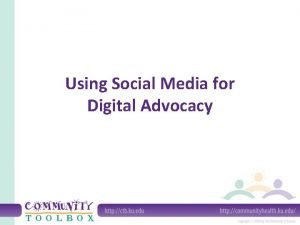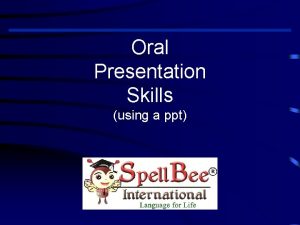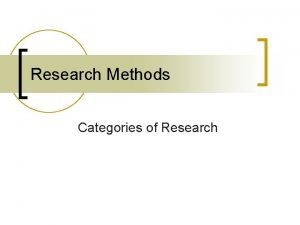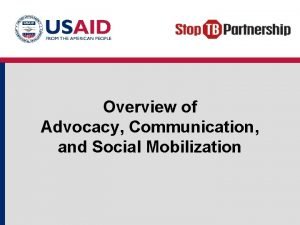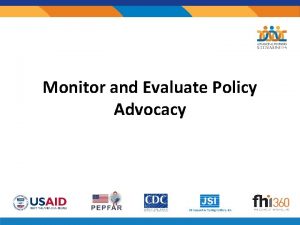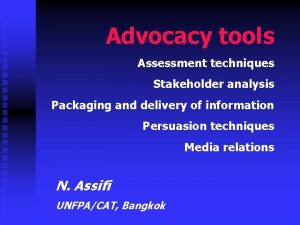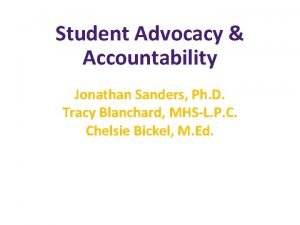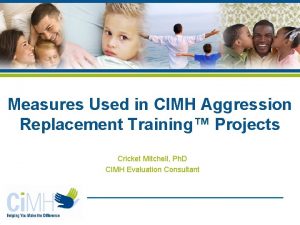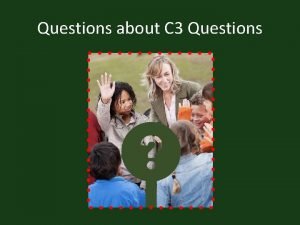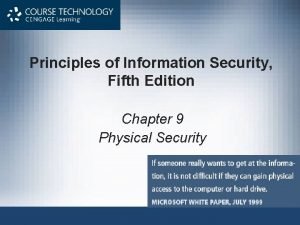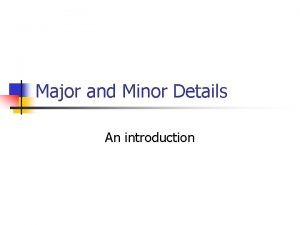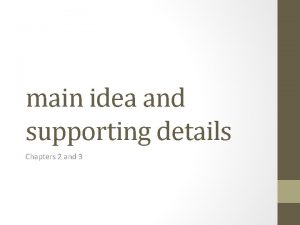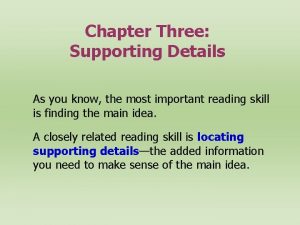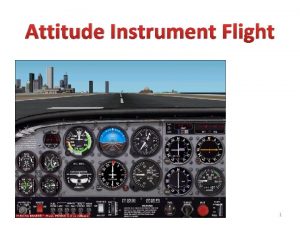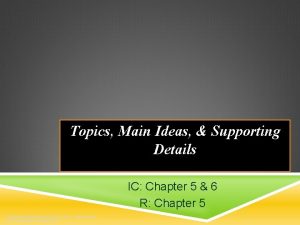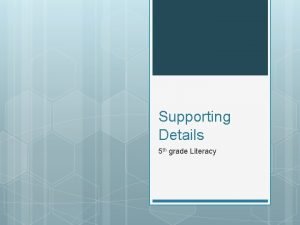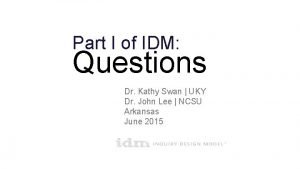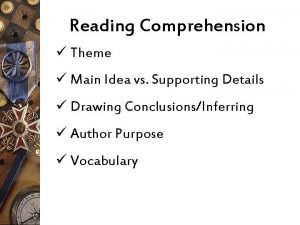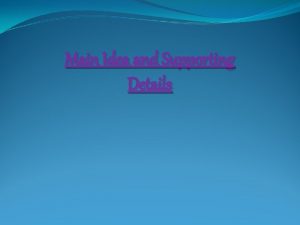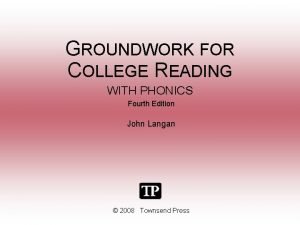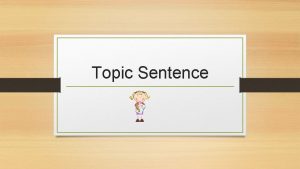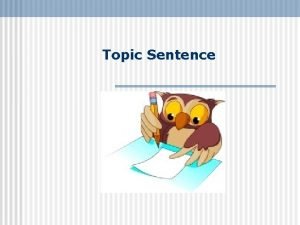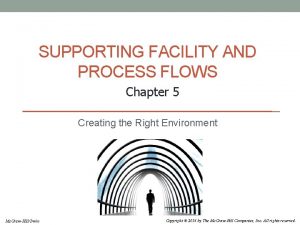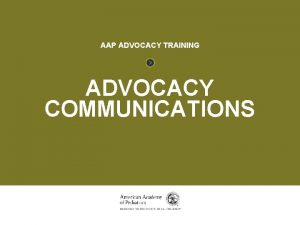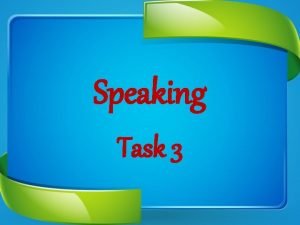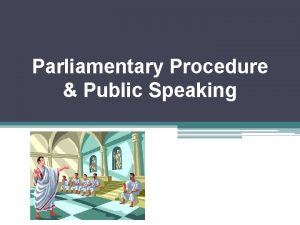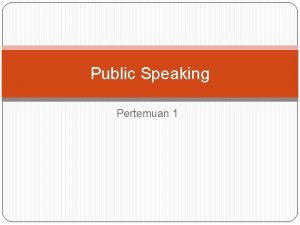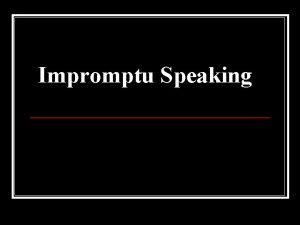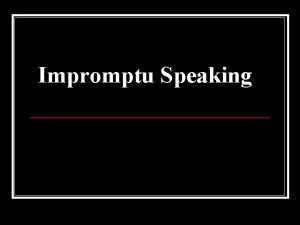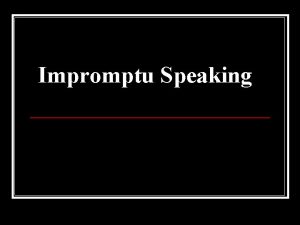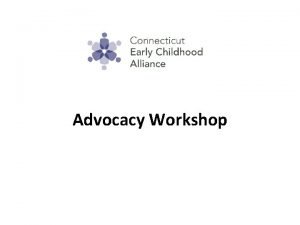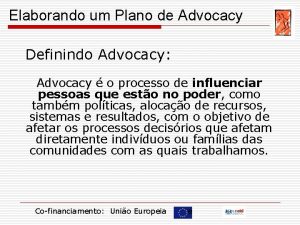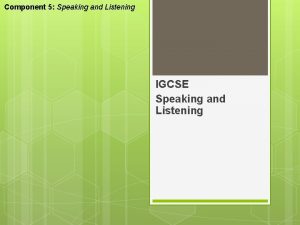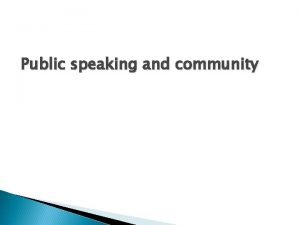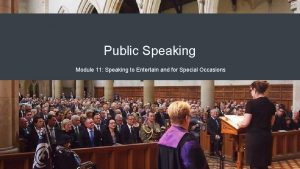Advocacy Training ADVOCACY Advocacy Supporting and speaking up








































- Slides: 40

Advocacy Training

ADVOCACY � Advocacy - Supporting and speaking up for our children � Lobbying – The attempt to influence a public official or decision-maker in favor of a specific cause or opinion � PTA was founded on Advocacy, it’s what sets us apart from other parent groups � PTA Advocacy efforts work in conjunction with other aspects of PTA

ADVOCACY HISTORY Quick history of PTA advocacy and legislation � In 1897 Alice Mc. Lellan Birney and Phoebe Apperson Hearst called for action to eliminate threats that endangered children, forming what would become the PTA � Issues that have been tackled by the PTA include: child labor laws, creation of kindergarten classes, public health services, hot lunch program, juvenile justice system and mandatory immunizations.

WHO ARE THE PLAYERS National PTA Legislative Department � Develops the PTA Federal policy � Tracks Federal bills, appropriations, regulations, reauthorization processes, etc. � Issues Actions Alerts on Federal issues � Networks with other National organizations � Organizes testimonies and strategic meetings

WHO ARE THE PLAYERS State Legislative Department – Missouri’s is the Department of Legislation and Advocacy � Develops the Missouri PTA Legislative platform � Tracks bills, testifies and issues Action Alerts � Develops the Legislative Handbook Legislative webpage, Contact articles and monthly legislative suggestive reports (Sept-May) � Networks with other State organizations & groups � Assist units and councils with Town Hall meetings � Oversees State Resolutions and Position Statements

WHO ARE THE PLAYERS Federal Legislative Chair � Liaisons with National Legislative department � Passes along Federal information and Action Alerts to the state board, units and councils � Represents Missouri at the National Legislative Conference & PTA on the Hill annual event � Responsible for the state Legislation and Advocacy Department

WHO ARE THE PLAYERS State Legislative Chair � Keeps abreast of bills in Missouri Legislative assembly � Issues Action Alerts on state issues � Works with units and councils in the planning and organizing of Town Hall meetings � Assists unit and council legislative chairs

WHO ARE THE PLAYERS State Resolution Chair � Has a working knowledge of Missouri Resolutions and Position Statements � Evaluates Resolutions sent to the state for consideration at convention � Sends MOPTA resolutions on to the National PTA � Determines implementation for resolutions and positions

WHO ARE THE PLAYERS Unit/council Legislative Chair � Gives legislative updates in the form of reports at meetings and articles for unit/council newsletters � Passes along Action Alerts to unit/council members � Encourages participation in the JC/DC network � Organizes Town Halls (in conjunction with the State Legislative chair), candidate forums, voter registration, candidate informational questionnaires, etc.

IF NOT YOU, THEN WHO? “The world is run by those who show up” Powerful lobbyist groups spend a great deal of money and time trying to influence elected officials.

LOBBYIST OR ADVOCATES? Quite often the words “lobbying” and “advocacy” are used interchangeably. However there is a difference. All lobbying is a form of advocacy but not all forms of advocacy are lobbying. Advocacy encompasses a wide variety of activities. In the context of PTA, this means supporting and speaking up for children – in schools, in community and before government bodies and other organizations that make decisions affecting children. Lobbying is defined as the attempt to influence a public official or decision-maker in favor of a specific opinion or cause.

IRS DEFINITION OF LOBBYING In general, no organization may qualify for section 501(c)(3) status if a substantial part of its activities is attempting to influence legislation (commonly known as lobbying). A 501(c)(3) organization may engage in some lobbying, but too much lobbying activity risks loss of tax-exempt status. � Legislation includes action by Congress, any state legislature, any local council, or similar governing body, with respect to acts, bills, resolutions, or similar items (such as legislative confirmation of appointive office), or by the public in referendum, ballot initiative, constitutional amendment, or similar procedure. It does not include actions by executive, judicial, or administrative bodies. � An organization will be regarded as attempting to influence legislation if it contacts, or urges the public to contact, members or employees of a legislative body for the purpose of proposing, supporting, or opposing legislation, or if the organization advocates the adoption or rejection of legislation. �

PTA DON’Ts � Invite only one candidate in an election to come speak to the PTA. � Tell PTA members to only vote for a candidate who supports X position. � Distribute any campaign materials on behalf of a candidate. � Wear campaign buttons or t-shirts during a PTA meeting. � Establish or support PACs (Political Action Committees).

PTA DOs PTAs should support issues that are good for children and youth. PTA should oppose issues that are bad for children and youth. That includes state and national legislation, as well as local laws and school district policies. PTA can and should take a stand on bond and levy issues. � PTAs can sponsor public forums (including candidates forums – all candidates must be invited), lectures and debates. � PTAs can send out questionnaires to all candidates asking in an unbiased way for their positions on issues. The results must be reported accurately and without editorial comment. � PTAs can conduct voter registrations. The registration must be open to anyone, regardless of which party or candidates they want to vote for after registering. � Remind members to vote. � Educate candidates on issues important to PTA. �

NATIONAL LEGISLATIVE CONCERNS National PTA 2014 Federal Public Policy agenda � Education – ESEA due for reauthorization � Child health and nutrition � Juvenile Justice and Delinquency – JJDPA due for reauthorization (last reauthorization 2002) � School Safety

STATE LEGISLATIVE CONCERNS � Local control of schools � Increased funding for programs & services aimed at the prevention of child abuse, neglect and maltreatment � Tax credits or tax deductions � Increased parent involvement in their children’s education � Funding for renovation & construction school facilities, and improve the routes to schools � Early Childhood Education

ISSUES The PTA addresses issues that are in line with our Mission and Purposes. The resolutions and position statements passed and approved by the membership define how and if we can address or speak to an issue. When representing PTA on a particular issue always present the will of the membership not your own personal views.

CHECK TO SEE IF PTA HAS A STANCE � http: //www. pta. org/public_policy. asp � http: //www. mopta. org/legislation/resolutions. html � Contact MOPTA Legislative Department

ACTION ALERTS How MOPTA and NPTA gets information out on issues � Take Action Alerts � http: //cqrcengage. com/npta 2/home? nav. Item. Numb er=3451 � JC/DC Network � http: //www. mopta. org/subscribe-to-legislativealerts. html

JC/DC NETWORK � JC/DC Network is MOPTA’s call to action email alert system

JC/DC NETWORK

JC/DC NETWORK

PTA TAKE ACTION � PTA Take Action is National PTA’s call to action email alert system

PTA TAKE ACTION

PTA TAKE ACTION

PTA TAKE ACTION

PTA TAKE ACTION

CORRESPONDENCE � A brief personal visit creates a connects and leaves a lasting impression. � The second best way to correspond is by email � Keep a word document with emails to and from legislators � Send in word document with At. Law application � Lots of responses will be form letters � Non-form letters should be forwarded on to VP of Leg. � angeld@mopta. org

CORRESPONDENCE Personal Visits � Make an appointment ahead of time and arrive promptly. � Make sure your legislator knows you are speaking on behalf of the PTA. Bring copies of the current MOPTA Legislative Priorities flyer. � Present yourself in a professional manner – business casual is acceptable. � Be reasonable in presenting your position(s). Be a good opponent by fighting the issue, not the person. � Present the facts and reasons why your PTA is involved in the issue – your elevator speech. � Thank your Legislator for their time and interest.

CORRESPONDENCE Emails/letters � Keep it brief, clear, and concise. � State the bill you are addressing by number or popular name. � Make sure you state why you want the bill supported or opposed. � Avoid abbreviations or trendy letters, fonts or symbols. � Include your contact information – home address. � Proofread!!!

ISSUES NOT ADDRESSED There are many issues affecting children that are not addressed by PTA resolutions and positions. � Writing a resolution – consider attending the Resolution workshop, refer to the Legislative Handbook and contact the State Resolution Chair or the Vice President of Legislation and Advocacy

MOPTA KIDS FIRST TOWN HALLS � Hosting a Town Hall � Legislative Handbook � Getting to know how your legislators think about PTA issues � Opportunity to network with your legislators � State Legislative Chair assists and provides a MOPTA moderator for the event

CHILD ADVOCACY DAY � Jefferson City, MO each April � Excellent time to speak with legislators � Talking points/Leave behinds provided � Have the option of having someone with you when speaking to legislators � Promote Child Advocacy Day to units and members

TALKING TO LEGISLATORS � Make an appointment � Dress professionally � Be on time � Address legislators with title – Senator or Representative � Be honest � Utilize talking points/leave behinds � Thank them for their time and service

RESOURCES � Advocacy resources webpage � Legislative Chair Report Template � Letter to Legislator Template � Access to NPTA Online Advocacy Toolkit � Voter information and registration � Media contacts � Links to additional resources and sites � Capital Chatter webpage � Resolutions webpage � National Public Policy page – advocacy toolkit, PTA votes, Federal public policy, Common Core Standards, etc.

www. mopta. org/legislation

At. Law AWARD � 2013 – 4 individual awards and 6 unit/council awards � 2014 goal – 50 individual awards

INDIVIDUAL At. Law AWARD

UNIT/COUNCIL At. Law AWARD

NEED HELP? � Where to look � Who to contact Angel Davis Michelle Mc. Laughlin Vice President, State Legislation Chair Legislation and Advocacy michellem@mopta. org angeld@mopta. org Kim Weber Dorothy Gardner MOPTA President-Elect kimw@mopta. org dorothyg@mopta. org
 Digital advocacy definition
Digital advocacy definition Soft skills development ppt
Soft skills development ppt Research objectives sample
Research objectives sample Advocacy goals and objectives examples
Advocacy goals and objectives examples Advocacy communication and social mobilization
Advocacy communication and social mobilization Monitoring and evaluation in advocacy
Monitoring and evaluation in advocacy Packaging and delivery of information in advocacy
Packaging and delivery of information in advocacy Lsu student advocacy and accountability
Lsu student advocacy and accountability Training is expensive without training it is more expensive
Training is expensive without training it is more expensive Metode of the job training
Metode of the job training Aggression replacement training facilitator training
Aggression replacement training facilitator training Topic sentence about train system
Topic sentence about train system Examples of supporting questions
Examples of supporting questions Failure of supporting utilities and structural collapse
Failure of supporting utilities and structural collapse Major and minor supporting sentences adalah
Major and minor supporting sentences adalah Signal word
Signal word What is about
What is about Minor supporting detail?
Minor supporting detail? Main idea and supporting details examples
Main idea and supporting details examples Main idea and supporting details jeopardy
Main idea and supporting details jeopardy Topic and concluding sentences examples
Topic and concluding sentences examples Primary and supporting instruments
Primary and supporting instruments Main idea and supporting details examples
Main idea and supporting details examples Instrument cross check
Instrument cross check Compelling questions examples
Compelling questions examples Topic, main idea supporting details
Topic, main idea supporting details Topic sentence supporting details
Topic sentence supporting details Key sentence and supporting details
Key sentence and supporting details Compelling vs supporting questions
Compelling vs supporting questions Supporting detail
Supporting detail Theme vs topic
Theme vs topic Major and minor details quiz
Major and minor details quiz Whats a central idea
Whats a central idea Major and minor supporting details
Major and minor supporting details Example of main idea and supporting details
Example of main idea and supporting details What is a topic sentence
What is a topic sentence Topic sentence paragraph examples
Topic sentence paragraph examples Supporting facility
Supporting facility Details and examples
Details and examples Topic sentence and supporting details examples
Topic sentence and supporting details examples Main idea and supporting details example
Main idea and supporting details example
